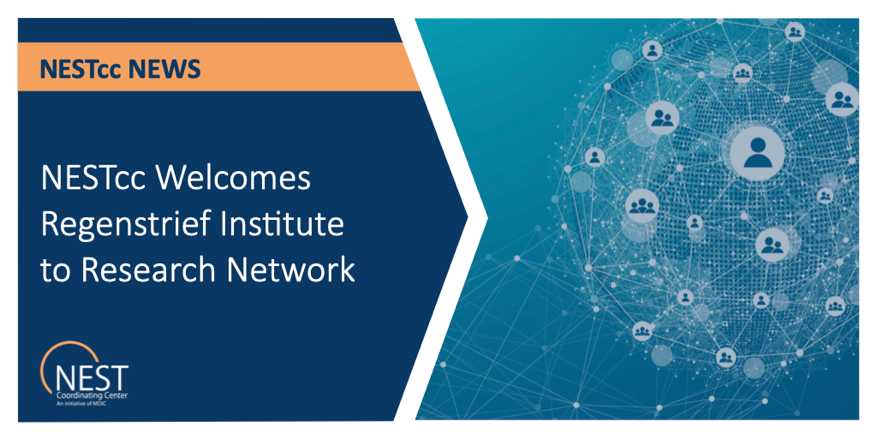Partnership to advance generation of high-quality evidence in medical device evaluation
The National Evaluation System for health Technology Coordinating Center (NESTcc), an initiative of the Medical Device Innovation Consortium (MDIC), today announced the Regenstrief Institute as the newest Network Collaborator to join the NESTcc Research Network.
NESTcc has assembled a Research Network of internationally recognized health organizations to advance the generation of real-world evidence and foster collaboration with stakeholders across the medical device ecosystem. Through the curation of diverse data sources and research expertise, and the application of rigorous research methods and data quality standards, NESTcc enables efficient, high-quality studies of medical devices. NESTcc has developed projects across disease areas, device classes in 510(k) and PMA pathways, and all stages of the total product life cycle, recently opening access to its Research Network for sponsored studies.
“We have followed NESTcc since its inception and are excited to work together to deliver on our shared aim of improving care and patient lives through scientific research,” said Peter Embí, M.D., M.S., president and chief executive officer, Regenstrief Institute. “This partnership will amplify the impact of Regenstrief’s data expertise, allowing us to collaborate with industry partners to provide real-world data and real-world evidence, which has the power not only to accelerate innovation but also transform clinical, regulatory, and reimbursement decision-making. We look forward to leading the way with NESTcc and its outstanding community of Network Collaborators.”
Based in Indianapolis, Regenstrief Institute is a global leader dedicated to improving health and healthcare through innovations and research in biomedical informatics, health services and aging. With access to over 13 billion clinical data elements from more than 16 million unique patients across 117 hospitals and 18,000 practices, Regenstrief Institute’s cadre of investigators are linked to one of the largest and most comprehensive biomedical and health informatics laboratories in the world. The institute’s expertise spans clinical data standards, health system interoperability, clinical Informatics, artificial intelligence and data science, health services and outcomes research, geriatrics, social science, epidemiology, and biostatistics.
“With a wealth of interdisciplinary health services research and longitudinal EHR, claims, registry and pharmacy data that is generalizable to broad segments of the U.S. population, Regenstrief Institute enables NESTcc to further scale the capabilities of our Research Network,” said Sandra Siami, MPH, senior vice president, NESTcc, MDIC. “We are thrilled to join forces with Regenstrief to drive the value of real-world evidence and meet the growing demand for real-world data that is fit for purpose.”
With the addition of Regenstrief Institute, the NESTcc Research Network is now comprised of 15 Network Collaborators with access to data from more than 150 million patients.
About Regenstrief Institute
Founded in 1969 in Indianapolis, the Regenstrief Institute is a local, national and global leader dedicated to a world where better information empowers people to end disease and realize true health. A key research partner to Indiana University, Regenstrief and its research scientists are responsible for a growing number of major healthcare innovations and studies. Examples range from the development of global health information technology standards that enable the use and interoperability of electronic health records to improving patient-physician communications, to creating models of care that inform practice and improve the lives of patients around the globe.
Sam Regenstrief, a nationally successful entrepreneur from Connersville, Indiana, founded the institute with the goal of making healthcare more efficient and accessible for everyone. His vision continues to guide the institute’s research mission.
About the National Evaluation System for health Technology Coordinating Center
In 2016, the U.S. Food and Drug Administration (FDA) awarded the Medical Device Innovation Consortium (MDIC) funding to establish the National Evaluation System for health Technology Coordinating Center (NESTcc). The Coordinating Center seeks to support the sustainable generation and use of timely, reliable, and cost-effective Real-World Evidence (RWE) throughout the medical device lifecycle, using high-quality Real-World Data (RWD) that meets robust methodological standards for the purpose of enhancing regulatory and clinical decision-making. For more information, visit http://www.nestcc.org.
About the Medical Device Innovation Consortium
Founded in 2012, the Medical Device Innovation Consortium (MDIC) is the first public-private partnership created with the sole objective of advancing medical device regulatory science throughout the total product life cycle. MDIC’s mission is to promote public health through science and technology and to enhance trust and confidence among stakeholders. MDIC works in the pre-competitive space to facilitate development of methods, tools, and approaches that enhance understanding and improve evaluation of product safety, quality, and effectiveness. Its initiatives improve product safety and patient access to cutting-edge medical technology while reducing cost and time to market. For more information, visit http://www.mdic.org.
Funding for NESTcc was made possible, in part, by the Food and Drug Administration through grant (3 U01 FD006292-03S1). Views expressed in written materials or publications and by speakers and moderators do not necessarily reflect the official policies of the Department of Health and Human Services; nor does any mention of trade names, commercial practices, or organization imply endorsement by the United States Government.










